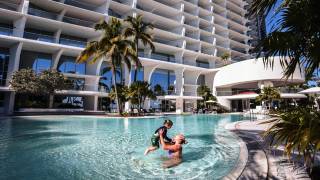|
Article Courtesy of The Miami Herald
By Rebecca San Juan
Published December 13, 2021
Miami’s coastline condominiums drew a stampede of buyers
in the three months after the June high-rise tower collapse in Surfside,
exemplifying the condo market’s resilience despite the tragedy.
Third-quarter condo sales figures for the eight beachfront communities
showed a sharp increase of buyers’ closed purchases along the coast,
seemingly undeterred by the collapse.
|
Almost double the
number of buyers, compared to the same quarter last year,
bought properties in Fisher Island, South Beach, Mid-Beach,
North Beach, Surfside, Bal Harbour, Sunny Isles Beach and
North Miami Beach, according to sales data from the Miami
Association of Realtors. Condo sales totaled 1,672 in the
eight communities during the July-through-September period,
up from 854 in the third quarter of 2020 and 876 in the same
stretch of 2019. However, monthly coastal condo transactions
did dip 34% from July to September, from 688 to 454
completed deals, showing there were jittery prospects who
held off buying. Sales numbers in September actually reflect
activity in July and August since it takes 30 to 60 days for
sales under contract to close.
The 10 real estate brokers and market experts the Miami
Herald interviewed for this story were divided on what
caused that monthly beachfront condo-buying slowdown from
early to end of summer. Some blamed the collapse, others the
area’s usual summertime sales lull. Many calls from
interested prospects and real estate agents’ condo showings
stopped in the initial days after the 12-story Champlain
Towers South crumbled on June 24 at 8777 Collins Ave.,
killing 98 people.
Some residential real estate experts had
expected a lingering slowdown to the condo frenzy given
escalating safety concerns regarding the structural
integrity of condos across Miami-Dade County, especially
along the coast. |
|
Sierra Drew plays with her son Shai Librati, 2, at
Jade Signature Condominium at 16901 Collins Ave., Sunny Isles Beach
on Friday, Dec. 3, 2021. Third-quarter condo sales figures for the
eight Miami beachfront communities showed a slew of buyers closed
purchases compared with a year ago.
|
“I thought it was
going to have a longer and profoundly more chilling impact
throughout Miami. It wasn’t the case,” said Danny Hertzberg,
sales associate at Jills Zeder Group, an affiliate of
Coldwell Banker.
Bill Hughes, clinical professor and research director at the
University of Florida’s Kelley A. Bergstrom Real Estate
Center, has been studying the effects of the collapse on the
area real estate market with University of Florida
Warrington College of Business assistant director Fernando
Mattar. “The pandemic increased demand for housing,” Hughes
said, with people spending more time at home. “Now we have
the counter event (the collapse). It looks like it has
dampened the market, (but) it has not shut down the market.”
Sunny Isles Beach and North Miami Beach experienced the
strongest buying activity during the third quarter, with
just over 660 sales. Fisher Island had the least, with 16
deals during the three months. Summer buyers were attracted
mainly to high-rises built after 2000, including Jade
Signature in Sunny Isles Beach, Ritz-Carlton Bal Harbour and
Icon South Beach.
“People were coming to newer buildings,” said Sandra
Chartouni, director of sales at Jade Signature. “Did they
ask about the construction? Absolutely.” But those that came
often bought a unit, Chartouni said. Her tower saw seven
deals since July, ranging in price from about $3 million to
$7 million. One of Sabrina Cohen’s prospective buyers did
cancel condo shopping plans due to the Surfside collapse,
fearing high-rise living. The Coldwell Banker Miami Beach
sales associate said that was her only cancellation since
the tower fell. She later sold three units in coastal
communities during the third quarter, two in South of Fifth
and another along the Venetian Causeway. Buyers often asked
about a condo building’s recertification status, a process
that checks structural and electrical condition and safety,
said RE/MAX Advance Realtor Vivian Fernandez. She sold a
handful of South Beach units to buyers from Boston and
Washington, D.C., during the recent quarter that ended Sept.
30. “It’s a question that they ask: ‘Is it safe?’” Fernandez
said of careful buyers. After she tells them a building
passed its 40-year recertification process or is in the
middle of one, the buyers “move onto the amenities, do they
allow pets, do they allow rentals. “You can tell the
difference when a building has been taken care of. If you
see that it was maintained,” she said, “well that helps calm
the nerves.” Meanwhile, median sale prices from July to
September soared by 154% in Fisher Island to $7.5 million,
21% in North Beach to $345,000, and 34% in Surfside and Bal
Harbour to $740,444. Prices dipped in that time by about 20%
in South Beach down to $365,000, 2% in Mid Beach to $477,450
and 2% in North Miami Beach and Sunny Isles Beach to
$470,000. Most experts expect condo sales to keep
increasing, given companies expanding to South Florida and
the lifting of a pandemic-related travel ban in November.
However, last week the Biden administration placed new
restrictions on foreign travelers entering the country due
to the new omicron coronavirus variant. Time will tell if
omicron affects the Miami coastal condo and broader housing
market.
“The switch has been flipped since the travel restrictions”
expired last month, said Scott Diffenderfer, a Realtor at
Compass. The 17-year industry veteran has several
prospective buyers from Europe. Last week alone,
Diffenderfer showed a handful of coastal units to three
Germans and two Italians. Avoiding predictions, University
of Florida’s Hughes and Mattar are waiting to see monthly
Miami-Dade beachfront condo sales figures from October
through January. “That reduction in the number of sales
(from July to September) seems to be influenced by the condo
collapse, because we don’t see that pattern elsewhere,”
Hughes said. “If, in fact, the Miami condo market has
tracked downward significantly that would have to be due in
part to that particular event.
|
